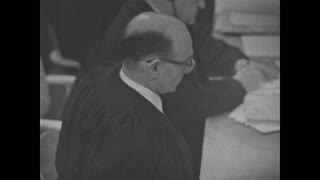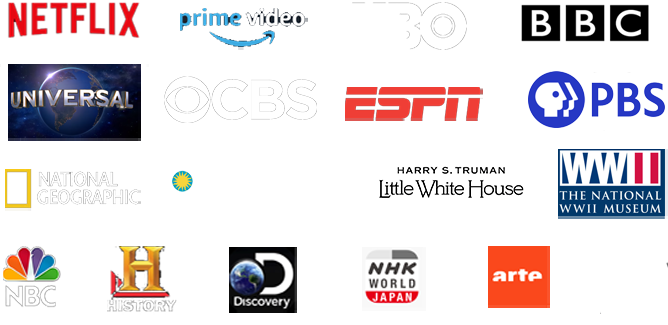In 1961, American film producer Milton Fruchtman convinced the Israeli government to televise the trial of a captured former German SS official, Adolf Eichmann. From the winter through the summer of 1961, director Leo Hurwitz led coverage of the pool TV coverage of the trial, and then oversaw the editing of highlights into “Verdict for Tomorrow” which was released by the Anti-Defamation League in 1961. Featuring host Patrick McVey and narrator Lowell Thomas (who also appears on camera), the film won the Peabody Award. Written by Gerald Pearsen and co-produced by ABC Capital Cities, the film uses the actual footage gathered during the Eichmann trial in Jerusalem, and utilizes the trial as a reminder of Nazism and the persecution of Jews rather than a “dated” legal presentation.
The events leading up to the trial are notable. Although briefly detained by the Allies in 1945, Adolf Eichmann managed to escape to Argentina where he was discovered over a decade later by the Mossad. He was taken captive and spirited to Israel in 1960. Eichmann’s role in the Holocaust was critical: he had participated in the January 1942 Wannsee Conference, where the so-called Final Solution to the Jewish Question was planned. He essentially facilitated and managed the logistics involved in the mass deportation of millions of Jews to Nazi ghettos and extermination camps across German-occupied Europe.
0:00-1:02: American actor Patrick McVey compares rats spreading disease in the night to bigots spreading hatred and fear. He emphasizes that while modern medicine has controlled physical diseases, bigotry still contaminates society, causing discrimination and damaging the nation’s reputation.
1:24-2:03: Lowell Thomas recalls the events of Kristallnacht on November 10, 1938, when Nazi mobs attacked Jewish properties and people, marking the beginning of the Holocaust.
2:03-3:36: Adolf Eichmann, responsible for transporting Jews to concentration camps, stands trial in Jerusalem. He denies guilt, claiming he was just following orders.
3:36-5:29: Eichmann’s defense argues he was illegally seized and questions the impartiality of the Israeli court. The prosecutor counters that the trial is justified.
5:29-9:00: The trial is significant for its global broadcast, highlighting the importance of understanding the causes and consequences of such atrocities to prevent them from happening again.
9:00-12:02: Witnesses testify about the horrors they witnessed during the Holocaust, including brutal killings and inhumane treatment.
12:02-16:06: Eichmann’s defense continues, portraying him as a mere tool of the Nazi regime, while the prosecution seeks to break down this argument.
16:06-19:40: Eichmann admits to knowing about the anti-Semitic policies but denies being an anti-Semite himself. The court questions the paradox of a Nazi official not being anti-Semitic.
19:40-22:02: Eichmann’s defense argues that he was following orders and that the responsibility lies with those who gave the orders, not those who carried them out.
22:02-28:08: The trial concludes with the defense pleading for Eichmann’s acquittal, while the prosecution emphasizes the importance of the trial in educating the world about the dangers of tyranny and dictatorship.
Adolf Eichmann was a leading member of the Nazi Party in charge of organising mass deportations of Jews to ghettos, concentration camps, and extermination camps. In 1960, his hiding place was discovered by Mossad, and he was kidnapped and brought to Israel to stand trial. On 11 April 1961, the trial began as. Eichmann was charged with crimes against the Jewish people, the first time a high-ranking Nazi had been charged with this crime, crimes against humanity and membership of criminal organisations.Throughout the trial, Eichmann proclaimed his innocence and said he was simply obeying orders from Hitler. In December he was found guilty and sentenced to death.
Motion picture films don’t last forever; many have already been lost or destroyed. For almost two decades, we’ve worked to collect, scan and preserve the world as it was captured on 35mm, 16mm and 8mm movies — including home movies, industrial films, and other non-fiction. If you have endangered films you’d like to have scanned, or wish to donate celluloid to Periscope Film so that we can share them with the world, we’d love to hear from you. Contact us via the weblink below.
This film is part of the Periscope Film LLC archive, one of the largest historic military, transportation, and aviation stock footage collections in the USA. Entirely film backed, this material is available for licensing in 24p HD, 2k and 4k. For more information visit http://www.PeriscopeFilm.com


